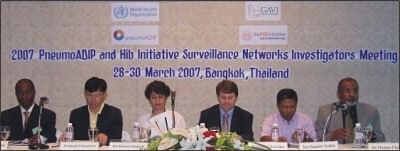Meeting to highlight burden of meningitis and pneumonia
Hib and pneumococcal disease--two major causes of life-threatening meningitis and pneumonia in south asian children
Tareq Salahuddin
Ever year the deadly diseases meningitis and pneumonia kill an estimated 2 million children globally under the age of 5 years. Of these deaths, many occur in Africa and Asia. Experts met in Bangkok last week and focused on two major life-threatening causes of pneumonia and meningitis: the bacteria Haemophilus influenzae type B (or "Hib") and streptococcus pneumonae. Both pneumonia and meningitis are vaccine-preventable.The urgent need for a sustained effort to accelerate the prevention of meningitis and pneumonia formed the core of discussions amongst leading researchers attending a Ministry of Public Health and WHO meeting. With Hib and pneumococcal diseases estimated to be responsible for up to 1.4 million child deaths globally each year - local efforts to measure the scale of the problem in Asia are gaining momentum. "Effective surveillance of meningitis and pneumonia has helped us to better understand the magnitude of the problem and help evaluate the impact of available vaccines", commented Dr Jean-Marie Okwo-Bele, Director, Department of Immunisation Vaccines and Biologicals, WHO. Sadly children with HIV/AIDS are up to 40 times more likely to get pneumococcal disease than children without HIV/AIDS, and in countries where rates of HIV/AIDS are high, Hib and pneumococcal diseases place an additional burden on national health systems. Dr Rana Hajjeh, The Hib Initiative, Project Director added: "systematic surveillance is critical to making evidence-based decisions for the introduction of pneumococcal and Hib vaccines. We could save millions of children's lives and make a significant move towards meeting a key UN Millennium Development Goal of reducing child mortality by two thirds by 2015". Dr Orin Levine, Executive Director, GAVI's PneumoADIP commented that now is an incredibly exciting time for those working in pneumococcal disease prevention. Through sustained financing from GAVI and an Advanced Market Commitment (AMC) vaccines are going to be reaching the children who need them as early as 2008. Dr Samir Saha, Professor of Microbiology of Institute of Child Health, Dhaka presented the Bangladesh story on recent success in surveillance network in the press briefing session. In an answer to a question, he said that the main obstacle to introduce the vaccines in developing countries was the lack of adequate political commitment. He stressed on the partnership among scientists, politicians, donor community and other bodies to save the lives of the children. The Pneumococcal and Hib Surveillance Network Investigators meeting was sponsored by the World Health Organisation, GAVI's PneumoADIP and the Hib Initiative and brought together experts from a number of Asian countries including, amongst others, Bangladesh, India, Indonesia, Republic of Korea, Mongolia, Nepal, Sri Lanka, Thailand and Viet Nam. The importance placed on this meeting reflects the global community's increasing focus on meningitis and pneumonia, and the urgent need for a global solution.
|

Thai Ministry of Public Health and WHO hosted meeting of leading researchers to highlight burden of meningitis and pneumonia on March 29, 2007 in Bangkok, Thailand |